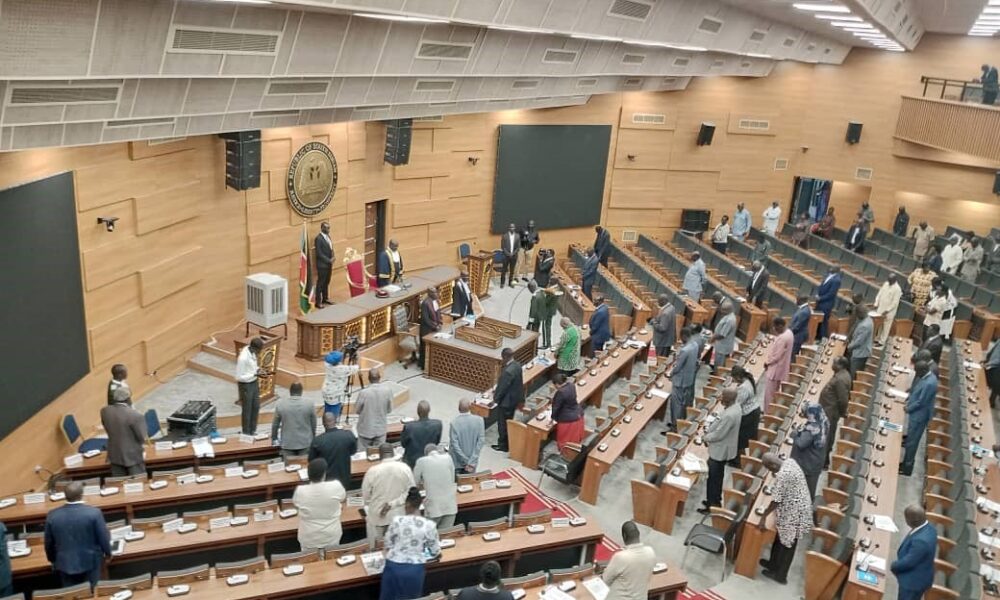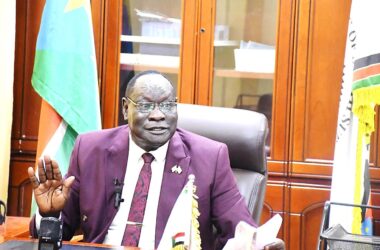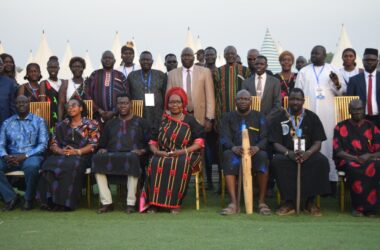By Philip Buda Ladu
Transitional National Legislative Assembly (TNLA) has felt the pinch of the unreliable electricity supply in the country as its Monday ordinary sitting was abruptly adjourned due to a power shortage.
The August House, on meeting its quorum for the day, was set to debate the National Bureau of Statistics Bill, 2024, in its third reading stage.
However, an unforeseen mechanical problem emanating from the main generator that supplies the whole premises cut the session short as the hall’s information and communication technology (ICT) system was down.
The inconvenience made it hard for members to sit without air conditioning, a sound system, and non-functional monitors in the hall; these are essential services that make the house lively and ease documentation.
1st Deputy Speaker, Rt. Hon. Oyet Nathaniel Pierino assumed the seat of the speaker to pass communication from the chair and hinted that the inconveniences couldn’t allow the sitting to proceed.
Addressing the house, Oyet announced 340 members present and 65 on permission, making a total of 405 members, which is enough quorum for a sitting to proceed.
However, he informed the August House that they encountered a lot of inconveniences on Monday morning with their technology breakdown, as witnessed by lawmakers.
“The ICT is not functioning because of the power supply, which we have experienced challenges with,” Oyet told MPs in his communication.
“Our big generator is down; the generator we are using now is a smaller one, which cannot power all our electronic appliances, and you know ICT appliances are very important during the sitting so that we can keep records of all that we do in the sitting,” he continued.
The Rt. Hon. Speaker acknowledged the severity of the situation.
“So it is also hot inside here, and the reliability of the generator may not last for long. Anytime the power might go off, we would be left in total darkness, so in view of that, I have summoned the honor to adjourn the sitting,” he declared.
Oyet, meanwhile, gave a ray of hope that the administration is working on the big generator, and he remains hopeful that by the end of the day, it will be repaired and sitting resumed on Tuesday.
Oliver Mori Benjamin, the spokesperson of the national parliament, also supplemented the speaker’s communications.
“Technical problems emanating from the main generator of the parliament and a short supply of public electricity made the parliament unable to proceed with the sitting; therefore, it adjourned God willingly until tomorrow (Tuesday) at 10 o’clock; that’s when the sitting will resume,” he stated.
Mori, however, emphasized that the probability of sitting resumption on Tuesday depends on the generator’s mechanical problem being fixed.
It is to be noted that the house was partially powered by a small backup generator that only lit the lights and connected an alternative sound system, but without guaranteed reliability, coupled with its low power output.
Also, the public electricity from the Juba Electricity and Distribution Company (JEDCO), which is unreliable, was in short supply to rescue the situation; as such, the Assembly had no other option than to bring business to a halt.
Currently, Juba relies on the mega-generator power grid being produced by Ezra Power and distributed by JEDCO, but customers have to contend with frequent load shedding and power outages due to insufficient power generation.
JEDCO power is not enough for the huge business and household demands, forcing some businesses to count on individual generators for their electricity needs including government intuitions like the parliament among others.
In September 2023, South Sudan activated an agreement with Russia for the construction of hydropower plants in the country, but till date, nothing tangible has been witnessed in that regard.
For the last two years, the government has signed agreements with its neighbors, Ethiopia and Uganda, to import electricity to its border towns.
According to USAID archived data released from June 2012 to September 2017, South Sudan has the lowest electricity consumption per capita in sub-Saharan Africa. That’s due to its underdeveloped energy infrastructure, which has been severely impacted by decades of conflict and instability.
Based on Statista research department data, South Sudan was ranked as the least-electrified country in the world in 2021, with only 7.7 percent of its population having access to electricity.
Investment in power generation and transmission infrastructure is considered a priority by the government; however, securing the intensive capital required from both public and private sector financiers remains a critical challenge.
The future of the country’s electricity generation looks to be dominated by hydropower.
The young East African country has the capacity for up to 2,100 MW in hydroelectricity power production; however, proposed projects must be funded before progress can be made.



